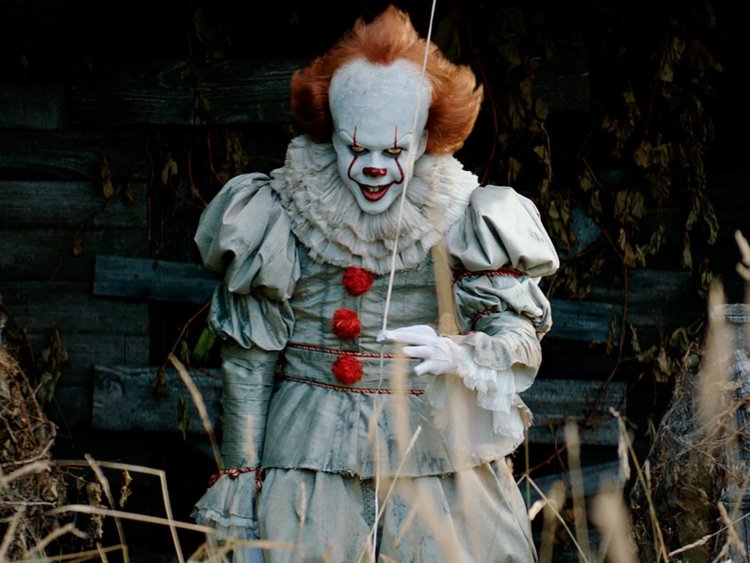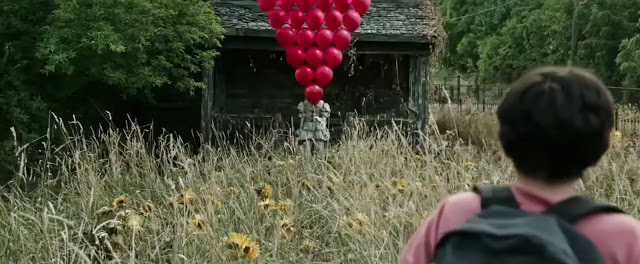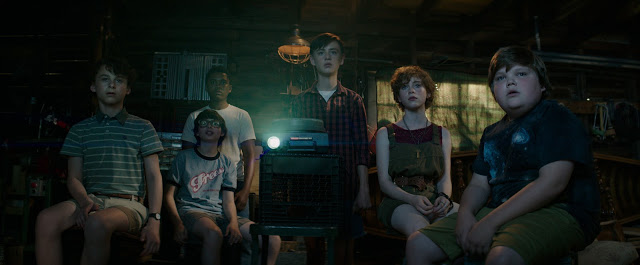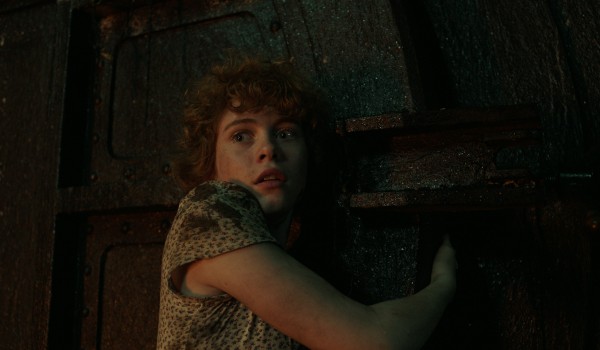 Fear is universal, even if it’s also personal. We’re all afraid of something, but our fears are typically our own. As many pop-culture artifacts have done before, It attempts to trade on this inherent tension between the institutional and the individual, conjuring a parasitic, metaphysical evil that torments its victims by transforming into the very thing that terrifies them most. In this, the film invites you to imagine being confronted not just by the nightmarish visions visited upon its characters, but by the horrors of your own heart.
Fear is universal, even if it’s also personal. We’re all afraid of something, but our fears are typically our own. As many pop-culture artifacts have done before, It attempts to trade on this inherent tension between the institutional and the individual, conjuring a parasitic, metaphysical evil that torments its victims by transforming into the very thing that terrifies them most. In this, the film invites you to imagine being confronted not just by the nightmarish visions visited upon its characters, but by the horrors of your own heart.
“What are you afraid of?” the trailer for It asks ominously. Good question. My own list of fears is quite lengthy, and while it contains a number of garden-variety phobias—snakes, rats, heights, etc.—it also includes a few anxieties specific to my temperament and amateur occupation. Like, say, the fear of being trapped in a theater watching a 135-minute horror movie that is by turns repetitive, silly, and dull.
OK, that’s not quite fair. It has plenty of problems—sluggish pacing, wispy plotting, a weird lack of suspense—but it’s a well-made and admirably serious endeavor, with strong performances and appealing characters. A dutiful and functional adaptation of Stephen King’s classic and humongous novel, It works best not as a horror movie but as a wistful document of nostalgia. It reminds you, with clarity and force, that you too were a kid once, navigating the gawky perils of adolescence with embarrassment and frustration. The difference, of course, is that you presumably weren’t being hunted by a grotesque clown intent on killing you and all your friends.
That clown, named Pennywise (Bill Skarsgård), is one of King’s most memorable and monstrous creations. And while Andy Muschietti, the director of It, may not yet be a great filmmaker, he is no fool; he recognizes that this misshapen circus freak is what audiences have paid to see brought to hideous life on screen. Scoffing at any notion of delayed gratification or slow-building tension, Muschietti introduces Pennywise in the film’s very first scene, where he lurks inside a sewer grate and coos faux pleasantries to a seven-year-old boy, Georgie (Jackson Robert Scott), in a high-pitched squeak. A few seductive phrases and one sickening chomp later, Georgie has lost a hand, and the puddles surrounding the grate have acquired a reddish tint.
That shot, of a small-town street’s rainy waters tainted with blood, is one of the more striking sights in a movie replete with ghoulish imagery. Muschietti, whose previous feature, Mama, supplied supernatural spookiness on a minimalist scale, struggles as a storyteller—the screenplay here is credited to three different writers, including Cary Fukunaga, whom Warner Bros. had previously tapped to direct—but he understands the rhythms of horror cinema, and he knows how to light and stage a scene. In It, he offers up a potpourri of disquieting abstractions yanked from the dark recesses of your mind: a red balloon floating sinisterly down a hallway, a sink spewing blood, limbs contorting into distended shapes, a slide projector suddenly operating of its own accord, a towering pile of children’s trinkets and bones. These ghastly visions don’t add up to much—despite Muschietti’s strenuous efforts, they fail to imprint on your psyche—but they can be arresting in the moment.
The human sufferers of these inhuman spectacles are the young teenagers of Derry, one of King’s pet fictional hamlets in Maine. The heroes are a familiar assortment of lovable misfits, each of whom possesses a distinguishing characteristic (kind of like The Lobster, except not). Four of them begin the film, which is set primarily in the summer of 1989, as fast friends: Bill (Jaeden Lieberher, from Midnight Special), Georgie’s older brother, blessed with resolve and cursed with a stutter; Eddie (Jack Dylan Grazer), a hypochondriac armed with multiple fanny packs; Stan (Wyatt Oleff, who played a young Chris Pratt in Guardians of the Galaxy and its sequel), a tentative sort studying for his Bar Mitzvah; and Richie (Finn Wolfhard, aka Mike from Stranger Things), a bespectacled loudmouth who has a virtual monopoly on the script’s best lines. All four are targets for abuse, not just from Pennywise but from Henry (Nicholas Hamilton), an older thug who’s less a typical bully than an outright psychopath. A racist, knife-wielder, and slut-shamer, Henry persecutes virtually everyone he meets, including three others who join with the rest of the gang almost by default: Mike (Chosen Jacobs), a home-schooled orphan whose grandfather slaughters lambs; Ben (Jeremy Ray Taylor), a pudgy newcomer with a taste for romantic poetry; and Beverly (Sophia Lillis), the one girl in this dorky boys’ club who is, naturally, tougher than all the dudes put together.
It’s a sizable main cast, but It does an impressive job differentiating its characters and conveying their childish camaraderie. The dynamic is hardly revolutionary—in addition to resembling King’s Stand by Me, any shot of boys on bicycles inevitably recalls ’80s-era Spielberg—but the teens seem realistic, and their petty squabbling and relentless joshing is surprisingly unforced (and also refreshingly profane). It’s genuine enough to make you wonder if It might have worked as a sweet and melancholic coming-of-age story, if it weren’t so devoted to being a horror movie.
But it is. And the back-breaking flaw of It—and I say this as a viewer who is exceptionally easy to frighten—is that it just isn’t scary enough. It’s perplexing. This is, after all, a film about an invulnerable, sadistic clown who eats children; as concepts go, that’s fairly terrifying. Yet It’s presentation of its putative nightmares is so rigid, so perfunctory, that it never acquires the crucial element of unpredictability. Muschietti desperately wants to get you leaning forward in your seat, but he actually just settles you.
To be sure, not every horror movie needs to be scary in order to be interesting. The problem with It is that its success hinges entirely on its scariness. By design, the film is recursive; it’s about the fear of being afraid. For that to work, the audience must share the characters’ dread.
Yet It is too formulaic to be dismaying. Strip away the teenage hijinks, and the movie functions as a boilerplate horror procedural. Virtually every scene follows the same pattern: One of the kids witnesses something uniquely petrifying—for instance, Eddie sees a leper, while Mike’s visions suggest the horrific death of his parents—freaks out, and then narrowly escapes to temporary safety. Most of these scenes are competent enough on their own terms, but their cumulative effect is severely muted; the film hews to its blueprint so methodically that its ruthless repetition—isolated characters constantly (and often stupidly) descending dark stairways and stumbling into gloomy corridors—quickly becomes stultifying. And while part of me appreciates Muschietti for largely eschewing the jump scare—that laziest of methods calculated to provoke sharp screams and nervous titters—It spends far too much time languishing, in dire need of a jolt.
It doesn’t get one, nor does it sacrifice liveliness for clamminess. Unlike, for example, The Conjuring or its follow-up—movies that struck a reasonably good balance between simmering suspense and sudden shocks—It is bizarrely devoid of tension. Instead, it just slinks and shuffles along, eventually collapsing into a torpid third act that’s mired in clichéd nonsense. What’s more, the film is thematically vacant; Pennywise is one of the most disturbing figures in modern literature, but Muschietti has nothing of consequence to say about him.
“This isn’t fun,” Stan says at one point, bemoaning that his summer vacation has turned into a supernatural scavenger hunt. “This is scary and disgusting.” The strangest, most disappointing thing about It is that he’s only two-thirds right. Muschietti can’t be accused of tackling this project lightly; you can practically taste the flop sweat that he poured into every scene, striving to bring King’s classic to cinematic life. I applaud his effort, but his execution is lacking. He wants to haunt your dreams, but he just ends up clowning around.
Jeremy Beck is the editor-in-chief of MovieManifesto. He watches more movies and television than he probably should.



